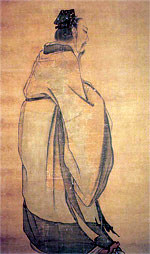Interpreting
the Heavens

King
Wu, the founder of the Zhou dynastu, whose rise was said to
have been heralded by celestial portents.
In
premodern China, as in the prmodern West, there was no categorical
distinction between astronomy and astology. Beginning with the
premise that the universe was intelligible - a promise that
is key to the traditional Chinese worldview - then it stood
to reason that the heavens were especially intelligible (tian,
"the heavens," is the same word often translated as
"Heaven" and understood as a divine power that was
able to control events). Heaven was understood to express itself
by the changes that came across its face. Chinese of all social
and intellectual backgrounds and of all periods spared no effort
in trying to interpret these changes.
From China:
The Land of the Heavenly Dragon edited by Professor Edward
L. Shaughnessy
|